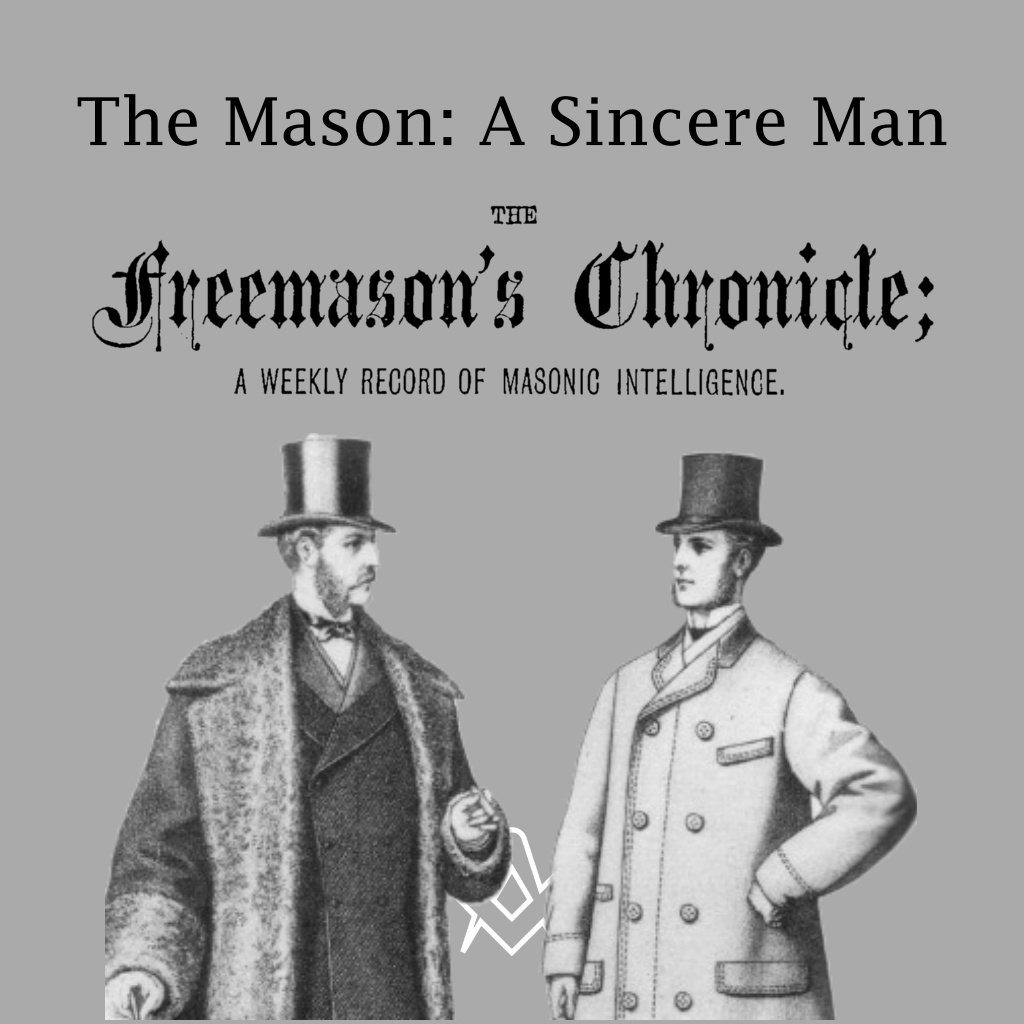In delineating the character of the Freemason, we shall avoid giving too free a rein to the imagination.
We may set up an ideal standard of excellence, but we shall not go the length of imagining that every Mason has attained that standard.
In our opening number we pointed out, with a certain freedom of language which some, perhaps, may have mistaken for overboldness, that at all events every representative Freemason, holding distinguished rank in the Fraternity, should exhibit that refinement of mind and manner which characterise the gentleman.
Otherwise, and we cited a not improbable case, he might involve the Order he represented in endless ridicule.
every true mason is essentially a sincere man
In the present article we shall mark the limits of our proposition somewhat more precisely, and not with-out reason.
We claim that every true Mason is essentially a sincere man.
It is quite possible, of course, that some may be more sincere than others. Some, again, are sincere under certain conditions, while others exhibit this trait under certain other conditions.
But, though the scale of sincerity which prevails among the brotherhood may be graduated, the quality itself is of the very essence of Masonry.
To take a man on the very threshold of his Masonic career;—-he joins the Order from pure love and respect for its principles.
So, offering himself as a candidate for the first degree, he openly avers that he has no ulterior hope of gain, in becoming a Mason.
He is aware of the respectable most universally accorded to Freemasons in free countries.
He is not ignorant of the oppression and persecutions to which the brotherhood have been and still are subjected under despotic governments, or of the reasons that have led to such oppression and persecution.
He knows there is one mystic tie which, quite apart from all other ties, unites all the brethren in all parts of the world.
With this knowledge, he voluntarily undertakes the obligations of Masonry. Can it or ought it to be doubted that such a man is actuated by sincerity ?
Some there may be who are influenced by other and less worthy motives.
They see or think they see their way clear to profit by the new “connection” they have established, anticipating, perhaps, a speedier advance in wealth and social estimation, or some other advantage more or less material.
In ordinary circumstances this kind of motive—that is, a desire for advancement in wealth and the worlds esteem—may not be looked upon very unfavourably, but we trust and believe that the Masons who hope for profit from their enrolment in the order are few and far between.
It is, perhaps, in the nature of things that some men should be more, some less sincere than others.
All minds are not constituted alike. There are those which are readily im-pressed by momentary occurrences, but the impression soon passes away, and is forgotten.
Others again are influenced but very slowly, but the influence is an abiding one.
There is, in fact, the same difference between these two classes of men as between tablets of wax on the one hand, and tablets of stone or brass on the other.
The inscription on the former is clear and precise enough while it lasts, but the material of the tablets is very perishable.
Equally clear and precise are the inscriptions on stone or brazen tablets, but stone and brass, as compared with wax, are, so to speak, imperishable.
The impression remains therefore, nor can it be removed, save by the utter destruction of the tablet on which it is engraven.
Again, the smooth soft surface of wax is capable of receiving any number of impressions one after the other.
A very moderate degree of heat or pressure suffices to remove all traces of the first, and but little is necessary to make a second, and, it may be, an entirely opposite one.
This is not possible with such unyielding material as stone or brass. Time and labour are required both to efface the old, and substitute the new inscription.
Thus, the impressionable man is no doubt sincere enough so long as the impression remains, but only for so long; while he who yields less readily is, in the majority of cases, more lastingly impressed.
Of course, every man must judge for himself, as to the worthiness or unworthiness of the motives which prompt him to any particular course.
Our province, is to point out what motives should influence the Mason, in the entering upon and fulfilling his duties. Assuredly not the least important among them is sincerity.
We offer these remarks in perfect good faith. Many people imagine that Masonry is a kind of hobby, which men follow for mere amusement.
They are not aware that every member on entering the brotherhood binds him-self, by the most solemn obligations, to certain rules of life, that he accepts certain principles to guide him in his relations and intercourse with the other brethren.
Some regard it as an ancient mystery, with much quaint ceremonial, but comparatively meaningless.
Others fancy that admission to a Lodge is pretty much the same thing as admission to a club.
It is perfectly true, that Masons have certain signs and symbols for the purpose of mutual recognition. It is highly probable that a Mason is what Dr. Johnson called a clubbable man.
But these notions fall very far short of the reality, ignoring, as they do, the true aims which have always influenced Masons from the remotest ages.
We are neither surprised nor offended that the outer world should hold these views. Considering the state of darkness in which they live, they could hardly, indeed, do otherwise.
The business of a Mason, is the fulfilment of certain sacred duties, and no one can conscientiously observe these duties, who is not animated by the purest and most disinterested motives, or, in other words, who is not a perfectly sincere man.
Extract: The Freemason’s Chronicle – January 23, 1875 – printed 146 years ago
 The Freemasons Chronicle, a weekly record of masonic intelligence, was first published 2nd January 1875 London, England as an independent weekly journal of masonic interest and continued for 27 years.
The Freemasons Chronicle, a weekly record of masonic intelligence, was first published 2nd January 1875 London, England as an independent weekly journal of masonic interest and continued for 27 years.
It should be the business of a journal devoted to the interests of the Order to attempt the removal of prejudices such as these, which, though they may have little perceptible influence upon the prosperity of the Fraternity, yet have the effect of preventing timid or ill-informed persons from enlisting under its banner.
It will not only attempt to keep pace with the growing literary requirements of the day, but it will seek to exhibit the Order to the non-Masonic world divested of its technical details, and clothed in the garb of Charity and Brotherly Love.
The questions of the hour, which exercise the minds of thoughtful men, will be handled freely and broadly, without any tinge of political or sectarian bias.
The memoranda of Masonic gatherings which will appear from week to week, will be full and accurate; and as free interchange of opinion is one of the best signs of life and vigour in any society, ample scope will be given for Correspondence on topics of interest to the Order.
If we may venture upon a new rendering of words which recent events have made memorable, we will say here, once and for all, that we will be keen men of business, and will spare no effort, consistent with honour, to achieve commercial success; but first, and before all things, we will prove to our brethren and the world that we are FREEMASONS.
Recent Articles: The Freemason's Chronicle
 Operative And Speculative Masonry Explore the fascinating transition from Operative to Speculative Masonry in our latest post. Discover historical insights from Augustus C. L. Arnold and Rev. Wm. P. Strickland, shedding light on Freemasonry's evolution and its enduring principles. Dive into the rich history and significant milestones that shaped modern Freemasonry. - The Freemason's Chronicle - 2 September 1876 |
 Discover the true essence of Freemasonry, an ancient order founded on the profound principles of love for God and man. It's a call to rise above mere appearances, to embody genuine virtue and benevolence, transcending societal pretense. Embrace the transformative power of simplicity, and let the authentic glories of Freemasonry inspire your path. |
 Discover the intriguing story of a man who became a Mason but openly professed his dislike for the institution. Unravel the peculiar circumstances that led him down this path and explore the unexpected consequences that followed. Dive into this thought-provoking account that challenges our notions of loyalty and reveals the complexities of human nature within the Masonic fraternity. |
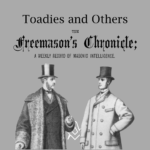 In the realm of Masonry, the principles of equality and respect are paramount. Yet, the presence of toadies—those who obsequiously seek favour from the influential—threatens these ideals. While Masonry embraces diverse beliefs and backgrounds, it rejects the sycophantic behaviours of toadies, flunkeys, and tuft-hunters, urging members to uphold genuine respect and self-worth. The Freemason's Chronicle - 22nd January 1876 |
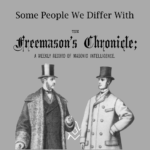 Unveiling the Unpleasant: Some People We Differ With Discover the intriguing dynamics of quarrels within the Masonic brotherhood. From the cantankerous to the litigious, the peevish to the vengeful, delve into the characters that challenge fraternal harmony. Explore their motives, temperaments, and the art of navigating disputes with these fascinating brethren. Brace yourself for a riveting journey into the world of conflicting personalities. |
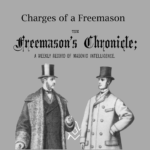 Unravelling the Masonic Mystique: A Deep Dive into the Freemasons' Charges - Explore the intricate world of Freemasonry, its principles, rituals, and the mechanisms for resolving internal disputes. Discover how this ancient fraternity fosters unity, promotes moral conduct, and upholds the sanctity of its secrets, while navigating the complexities of modern society. - The Freemason's Chronicle - 4 December 1875 |
 Unlock the hidden lessons of Masonic Studies! Don't settle for superficial knowledge or mere rituals. Discover the true depth and meaning behind Freemasonry. Expand your understanding of Tracing-Boards, Lectures, and more. Join regular Lodges of Instruction to enhance your Masonic journey. Become a knowledgeable Freemason, not just a token-bearer. Unleash the power of true Masonic wisdom today! |
 Uncover the incredible story of how Masonry saved the life of a Crimean War foot soldier in this historical and masonic account. Through the first hand experience of a soldier engaged in fierce hand-to-hand combat, witness the fateful encounter with a Russian Freemason that changed the course of his life. Learn how brotherhood and a deep dedication to the craft can lead to unforeseen and life-saving circumstances on the battlefield. |
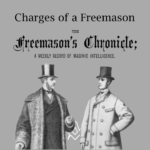 The Freemason's Chronicle - Charges of a Freemason The secrets of Masonry are the exclusive property of the Craft, and can never be communicated to one who is a mere labourer and not an accepted Mason. Hence, no labourer, that is, one who has not been regularly initiated in a legal Lodge. Article first published in The Freemason's Chronicle, 27 November 1875 |
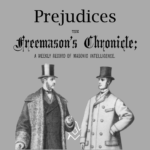 The Freemason's Chronicle - Prejudices Prejudices are partial judgments in favour of, or against certain persons or things, and, for convenience sake, may be ranged in two categories—those which are, comparatively speaking, harmless, and those which are harmful. Article first published in The Freemason's Chronicle, Oct. 2 1875. |
 The Freemason's Chronicle - Cliques Is Freemasonry - a Clique ? Man has been defined as a gregarious animal, but in his highly civilised condition he is gregarious only to a limited extent. First published in The Freemason's Chronicle, Oct. 2 1875, addresses the same challenges then as now. |
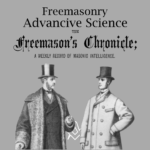 The Freemason's Chronicle - Freemasonry - an Advancive Science Is Freemasonry - an Advancive Science ? Not to confuse advancement with innovation. Has it been the case that Freemasonry's survival for 300 years plus is due to being an Advancive Science, tending to advance. First published in The Freemason's Chronicle 18 September 1875, addresses the same challenges then as now. |
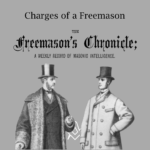 The Freemason's Chronicle - Charges Of A Freemason An interpretation of the "Charges of a Freemason", written Bro. Cornelius Moore and published in 1875, that introduce certain opinions that for some readers, will not sit well in contemporary times. - The Freemason's Chronicle, Sept. 11, 1875 |
 On The Order Of The Temple And Its Doctrine. THE Order of the Temple is divided into two great classes, denominated respectively the Order of the Temple and the Eastern Order. The Eastern Order gave birth to the Order of the Temple, and in the course of time has become an appendage of the latter. It is in ancient Egypt that we find the cradle of the Eastern Order. The Freemason's Chronicle, Sept. 4, 1875 |
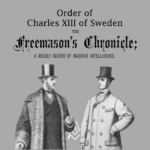 Order of Charles XIII of Sweden The following translation of the Manifesto of King JL Charles XIII of Sweden, on the occasion of his establishing the Masonic Order which bears his name, and of the Statutes of the said Order, may be interesting to our readers. The Freemason's Chronicle, Aug. 28, 1875 |
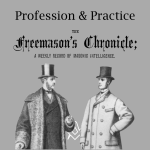 Most of our readers in the course of their experience, have doubtless met with enthusiastic brethren who take it for granted that a Mason can do no wrong. These enthusiasts are thoroughly convinced that the vast majority of those who join the Order are the most benevolent, the most moral, and the very noblest members of society. - The Freemason's Chronicle 10 July 1875 |
 An article investigating the relationship between masonry and citizenship. Are the principles of Freemasonry aligned with the freemason's claim to be a better citizen of the world? The Freemason's Chronicle - 19 June 1875 |
 A visitor must make clear his identity to the satisfaction of the Lodge he proposes to visit. More than once have we been asked to explain our views as to the reception of strangers in a Lodge. - The Freemason's Chronicle - 29 May 1875 |
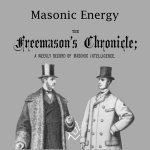 Is there reason in the accusation that Masonic energy looks only to a course of good feeds, when we can point to such grand results as have been achieved in these latter years, both in respect of the extension of our Order ? - 1May 1875 |
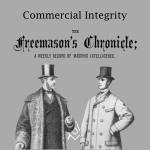 Implementing Freemasonry's peculiar system of morality in our day to day business affairs was the topic of this article, Commercial Integrity, first published in The Freemason's Chronicle - 8 May 1875 |
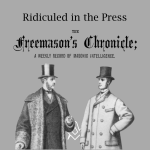 Ridicule has been somewhat illogically described as the test of truth. If it were so, Freemasonry ought to have perished long since. Two press reports from May 1875 covering the |
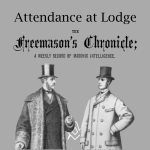 There are many things which Freemasonry will do for a man in the way of opening his mind and giving him larger and kindlier views of life, but Freemasonry itself, cannot eradicate the natural bias of the disposition. |
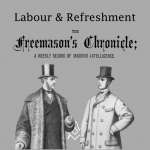 There is, we fear, too marked a tendency in very many Lodges to hasten through its labours, with a view to entering, as soon as possible, upon the business of refreshment. - The Freemason's Chronicle 17th April, 1875 |
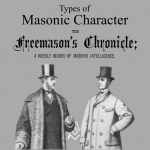 Another example that demonstrates that nothing really changes in Freemasonry. In an article the Types of Masonic Character published 145 years ago in The Freemason's Chronicle 10th April, 1875 |
 A brief history on the relationship between the British Monarchy and the craft - The Freemason's Chronicle 20th March , 1875 |
 What are the qualities of a convivial man and how does this dovetail perfectly in to Freemasonry ? 16th March, 1875 |
 A review of the "Sketch for the History of the Dionysian Artificers," a fragment, by Hyppoli to Joseph Da Costa - This little work may be regarded as, so to speak, the Holy Grail of Masonry. |
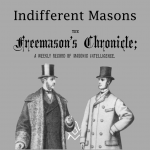 Nothing really changes, an article Indifferent Masons, From Le Monde Maçonnique 1874. Translation published in The Freemason's Chronicle 20th February, 1875 |
 In handling an intruder in the lodge, we endeavoured to show that a good Mason should be a gentleman, and a sincere man. The Freemason's Chronicle 20th February, 1875 |
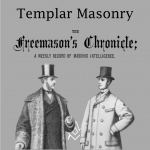 Templar Masonry - a historical aspect of the Religious and Military Order of the Temple published in The Freemason's Chronicle 13th February, 1875 |
 Secrecy perhaps the strongest objection urged by the enemies of the Masonic Order against its existence published in The Freemason's Chronicle 20th March 1875 |
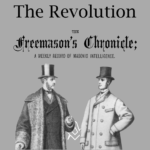 Freemasonry In The United States during And After The Revolution We take a look at Freemasonry in the United States during and after the Revolution first published in The Freemason's Chronicle - February 6, 1875 |
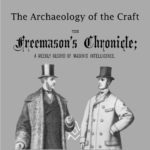 We take a look at the archaeological connection with the Craft, first published in The Freemason's Chronicle - January 30, 1875 |
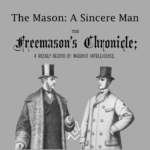 What it means to a Freemason to be a sincere man. Extract: first published in The Freemason's Chronicle - January 23, 1875 |
 What it means to a Freemason to be a citizen of the world ? First published in The Freemason's Chronicle - January 16, 1875 |
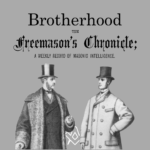 Brotherhood! In that one word what sympathetic associations arise. First published in The Freemason's Chronicle - January 9, 1875 |
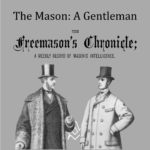 This opening article was written 145 years ago, yet it resonates with Freemasons today as it did then. First published in The Freemason's Chronicle, January 2, 1875, Issue 1 |
masonic knowledge
to be a better citizen of the world
share the square with two brothers

click image to open email app on mobile device



